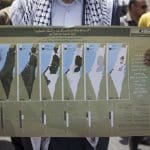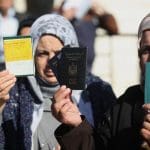
Executive Summary
Palestinians everywhere – including over seven million Palestinians in exile – have a right to Palestinian nationality. This right is guaranteed by international law, but British mandate and Israeli colonial authorities have continued to manipulate the concepts of citizenship and nationality to deny exiled Palestinians their nationality. This policy brief offers recommendations to exiled Palestinians and their representatives in the Palestine Liberation Organization (PLO) for how to lay the groundwork for future Palestinian nationality and citizenship legislation that challenges the Israeli regime’s racist policies.
Citizenship and nationality are not the same. While they are often conflated, delineating the difference between them must form the basis of the Palestinian response to Israeli apartheid policies. Citizenship is the process through which individuals enter into an agreement with states; they must therefore undergo a rigorous vetting process and must meet that state’s eligibility requirements. This also means that states can contest the rights of individuals to citizenship, thereby stripping them of citizenship under certain stipulations. But states cannot denationalize an individual. Under international law, nationality is innate and broadly defined as the link between an individual and a territory. International law protects individuals’ rights to nationality and requires all states to confer the nationality of a given territory on the peoples connected to it.
The 1923 Treaty of Lausanne enshrined Palestinian nationality into international law based on their attachment to the former Ottoman province by bloodline and/or residence. But British mandate authorities contravened the treaty by denying Palestinian nationality through citizenship laws, which they promulgated in 1925 and through which they prioritized naturalizing Jewish migrants as Palestinian citizens at the expense of over tens of thousands of Palestinians who had migrated to the Americas since the late 19th century. British policy thus effectively rendered these migrants, who continued to carry obsolete Ottoman documents, stateless Palestinian nationals.
Since its establishment, when it reset the existing nationality and citizenship laws, the Israeli regime has deliberately manipulated citizenship and nationality to secure a Jewish state. Like British mandate authorities, the Israeli regime has continually presented itself as the only authority with the right to confer both citizenship and nationality on all subjects with legal claims to belong to colonized Palestine. It has thus prevented Palestinians in exile from becoming Palestinian nationals or Israeli citizens – and prohibits Palestinian citizens of Israel from claiming their status as Palestinian nationals.
Palestinians have long objected to their exclusion from Palestinian nationality. During the British Mandate, Palestinians in Palestine and abroad repeatedly protested British policies through petitions submitted to the Government of Palestine and to the League of Nations, articulating their rights to Palestinian nationality using the language of international legal treaties. But over the last several decades, the question of Palestinian nationality has been largely absent from Palestinian political discourse. But with the UN recognition of Palestinian de jure sovereignty in 2012, the PLO pushed for Palestinian citizenship and nationality rights based on the Treaty of Lausanne, to no avail due to the legal complexities involved.
As the sole representative of the fragmented Palestinian people, the PLO must act as the guarantor of Palestinians’ rights to nationality, irrespective of corrupt Israeli and Palestinian leadership. One of the ways it can do so is through invoking the Treaty of Lausanne as an internationally recognized legal basis for nationality, as it did in 2012. However, Palestinians across the diaspora must also work with the PLO, and especially with its diplomatic corps, tasked with representing Palestinian refugees and exilees, to set the criteria for determining what it means to be Palestinian.
To do so, exiled Palestinians and their representatives in the PLO must:
- Create forums for Palestinians across the world to gather and set the criteria to determine who qualifies to register for Palestinian nationality. While the Treaty of Lausanne makes provisions for this, it is incumbent on Palestinians to articulate these rights in their own terms, much like indigenous communities in North America have been discussing for decades.
- Issue a population registry of exiled Palestinians to ascertain the number of Palestinians in the diaspora who qualify for Palestinian nationality.
- Draft a comprehensive nationality law that is based on the rights of Palestinians to their nationality, as determined by international law and by consensus. This would lay the groundwork for Palestinian citizenship conferral.
- Support Palestinians residing in foreign countries and holding secondary citizenship who demand to be recognized as Palestinian nationals by their host states.
- Demand Israel be held accountable for contravening international law in denying millions of Palestinians it expelled from Palestine in 1948 and 1967 their rights to Palestinian nationality. This must be done regionally and internationally, in every state where Palestinians reside.
Overview
Nationality and citizenship are different concepts under international law. While citizenship is a formal arrangement into which individuals enter with a state government, nationality is considered innate to individuals, and is protected outside of the purview of the state. However, since its inception in 1948, the Israeli apartheid regime has been strategically manipulating the two in order to deny exiled Palestinians—as well as other oppressed Palestinian communities—their rights to Palestine from wherever they may be.1
Today, over seven million exiled Palestinians have the legal right to be considered nationals of Palestine by birth and/or bloodline, irrespective of Israel’s racist nationality and citizenship laws. This includes five million refugees registered with UNRWA, as well as several million other Palestinian nationals with secondary citizenship or residency statuses in other countries. That is, if exiled Palestinians and their political representatives activate this internationally protected right through effective legal avenues, they would secure the legal status of being considered Palestinian nationals from exile, thus challenging Israel’s apartheid policies and laying the groundwork for future Palestinian nationality and citizenship legislation.2
This policy brief situates the ongoing political and legal crisis of exiled Palestinians’ nationality in the context of international law. It stresses the fundamental differences between citizenship and nationality, and shows how the two have been used interchangeably by British and then Israeli colonial and settler-colonial authorities to continue denying nationality and citizenship to Palestinians across the world. To this end, it does not focus on Palestinians within colonized Palestine whose rights to citizenship and nationality are dictated by the Israeli regime in 1948 territories, and by the Palestinian Authority (PA) and Israeli regime in the West Bank and Gaza. The brief thus offers recommendations for what Palestinians in the diaspora and their representatives in the Palestine Liberation Organization (PLO) should do to challenge Israel’s settler-colonial apartheid policies and secure exiled Palestinians their right to be considered as Palestinian nationals with rights to and in Palestine.3
Nationality, Citizenship, and International Law
While the right of return of Palestinian refugees is enshrined in UN resolutions, the right of all exiled Palestinians, including refugees and those naturalized as citizens of other states, to be considered nationals of colonized Palestine from across their diaspora—and thus, to demand legal representation and rights as Palestinians from abroad—must be activated. To understand why, we must grasp the core differences between nationality and citizenship, two concepts the British mandate and Zionist regimes have consistently and strategically used interchangeably to obscure nationality rights and bar exiled Palestinians from any claims to Palestine. Delineating the difference is thus crucial and must form the basis of the Palestinian response to these Israeli apartheid policies.
Delineating the difference between citizenship and nationality must form the basis of the Palestinian response to Israeli apartheid policies Share on X
Citizenship, which is conferred on individuals based on place of birth, the nationality of their parents, or naturalization through residency, is determined by governments in order to grant rights and responsibilities as members of the nation-state. In this way, individuals applying for state citizenship must undergo a rigorous vetting process and must meet that state’s eligibility requirements. States may also contest the rights of individuals to citizenship, thereby stripping them of citizenship under certain stipulations.
States, however, cannot denationalize a national. Under international law, nationality is broadly defined as the link between an individual and a territory. That link, referred to as the “genuine link” by the International Court of Justice (ICJ) since 1955, is determinable by bloodline (jus sanguinis), location of birth (jus soli), or long-term residency (jus domicile). Nationality is innate, unchangeable, and protected: article 15 of the Universal Declaration of Human Rights states that “everyone has the right to a nationality. No one shall be arbitrarily deprived of his nationality nor denied the right to change his nationality.” Indeed, this right is so universal, several states even extend the option to apply for citizenship through jus sanguinis to non-citizen nationals residing anywhere in the world.
Palestinians’ Historical Right to Palestinian Nationality
The right of Palestinians to belong as nationals to Palestine from anywhere in the world has been recognized since the ratification of the 1923 Treaty of Lausanne on August 6, 1924. While the treaty is the first legal document to promulgate Palestinian nationality globally, the 1869 Ottoman Nationality Law was the first to legally confer nationality on residents of Palestine jus sanguinis, jus soli, and jus domicile. Therefore, when British authorities laid siege to Jerusalem in December 1917, residents of Palestine were considered Ottoman Palestinian nationals, and they remained as such pending the Allied forces’ decision on what to do with the dismembered empire.
This status also applied to tens of thousands of Ottoman Palestinian nationals who had been emigrating from Palestine to the Americas for economic and political reasons since the 19th century. But on July 24, 1923, the Allied forces and the government of the newly formed Turkish republic signed the Treaty of Lausanne, officially delineating the borders of the republic. In exchange for the Allies’ recognition of Turkish sovereignty, Turkey relinquished all its imperial claims to its former territories, including the Arab provinces, now under European colonial mandates.
Consequently, former Arab subjects of the Ottoman Empire ceased to be Ottoman nationals, including those residing abroad. While article 34 of the Treaty of Lausanne made provisions for this, enabling individuals to declare the nationality “of the territory of which they are natives,” Britain contravened the treaty, as it had promised the Zionist Federation to establish a Jewish “national home” in Palestine in the 1917 Balfour Declaration.
As a result, it needed to ensure the steady flow of Jews to Palestine and their naturalization through residence as Palestinian subjects of the British Mandate for Palestine. British authorities thus legislated the first ever Palestinian citizenship ordinance in order to issue Palestinian citizenship documents to Jewish settlers. To be sure, this was in accordance with article 7 of the Mandate for Palestine, which stated that the Government of Palestine shall enact a nationality law with “provisions framed so as to facilitate the acquisition of Palestinian citizenship by Jews who take up their permanent residence in Palestine.”
In July 1925, Britain promulgated the Palestinian Citizenship Order-in-Council, which regulated Palestinian citizenship during the mandate. While the ordinance required British authorities to extend Palestinian citizenship to all qualifying applicants, they instead prioritized conferring the status on tens of thousands of incoming Jewish settlers (through jus domicile) at the expense of tens of thousands of Palestinian migrants (who had jus sanguinis and jus soli rights to citizenship). To justify this practice, British authorities regularly cited Palestine’s limited economic “absorptive capacity,” as well as the migrants’ inadequate proof of an intention to reside permanently in Palestine, absence from Palestine since before 1920, or, simply, their “patent undesirability.”
On March 8, 1937, two decades into Britain’s occupation of Palestine, the Government of Palestine reported that more than 28,000 Jews had been issued Palestinian citizenship documents between 1931 and 1936, and that out of a total of 4,941 citizenship documents granted in 1936, 4,847 were for Jews. By contrast, about 9,000 applications for citizenship had been submitted from Palestinians in Latin America alone by 1937; of those, not more than 100 were accepted. Palestinian migrants across the Americas, who amounted to roughly 40,000 by 1936, effectively became stateless Palestinian nationals carrying obsolete Ottoman documents.
Over the course of its 30-year occupation of Palestine, Britain persistently manipulated nationality by denying it through citizenship. And although Britain violated the Treaty of Lausanne in doing so, the League of Nations left the administration of Palestine entirely to the discretion of the British Crown. The governance of Palestine effectively fell outside of international law.
Palestinian Nationality Under the Israeli Regime
The Israeli regime’s ongoing contravention of international law since 1948 in denying millions of Palestinians throughout the world their rights to Palestinian nationality has its roots in a similar practice predating it by three decades. To wit, upon its creation, the new regime swiftly denied the 750,000 Palestinians who were exiled in 1948 their rights to Palestinian nationality; it did this again following its expulsion of 300,000 Palestinians from Palestine in 1967.
The right of Palestinians to belong as nationals to Palestine from anywhere in the world has been recognized since the ratification of the 1923 Treaty of Lausanne Share on X
Like its predecessor, the Zionist regime has deliberately manipulated citizenship and nationality in order to fulfill its demographic goal of securing a Jewish state. That is, like British mandate authorities, the Israeli regime has continually presented itself as the only authority with the right to confer both citizenship and nationality on all subjects with legal claims to belong to colonized Palestine.
These illegal acts are strategically obscured by a series of laws, the most significant of which are the 1950 Law of Return, the 1952 Nationality Law, and the 2018 Jewish Nation-State Law. In 1950, the new Israeli regime promulgated the Law of Return, which offered every Jew across the world the right to immigrate to the new Jewish state. This law was followed by the 1952 Nationality Law, which confirmed nationality for Jews worldwide under the Law of Return. As such, in 1952, the Israeli regime effectively promulgated Jewish nationality globally.
In this way, while Israel may have a citizenship regime in place for non-Jews to acquire Israeli citizenship through birth in 1948 territories, it remains a state for Jewish nationals above all. This was reaffirmed in the 2018 Jewish Nation-State Basic Law, which stated that the right to national self-determination is “unique to the Jewish people.” Consequently, the Israeli apartheid regime has ensured that Palestinians who have acquired Israeli citizenship can never become incorporated as nationals of the state, making it easier to denaturalize them.
Moreover, to forestall any exiled Palestinians seeking citizenship rights as former subjects of the British mandate, which had issued British Palestinian passports, the 1952 law retroactively repealed any citizenship conferral prior to the establishment of the Israeli state in May 1948. Thus, the Israeli regime effectively reset citizenship laws upon its establishment, rendering obsolete all existing documents related to Palestinian nationality and citizenship. This is illegal under international law, which requires that any “successor state” confer the nationality of a given territory on the peoples connected to it.
The Israeli regime also ensured that no Palestinian expelled in 1948 can qualify for Palestinian nationality or Israeli citizenship, since they are neither Jewish nor can be naturalized from afar. Under the 1952 law, to qualify for Israeli citizenship through residence, Palestinians have to have been inhabitants of 1948 territories by March 1, 1952, and they have to have remained inhabitants from the day the state was established until the day the nationality law was passed. None of the Palestinians expelled in 1948 qualify under this provision.
In Defense of the Right to Palestinian Nationality
The global population of Palestinian nationals who, since the Treaty of Lausanne, have had a legally recognized “genuine link” to the territory of colonized Palestine and, therefore, to belong to it as nationals, can stake claims to these rights from across the diaspora through different legal and political channels. That is, their birth and blood rights to Palestinian nationality remain intact, and a legal and political avenue to challenge the Israeli regime is still viable. Indeed, their predecessors who were denied Palestinian nationality through citizenship during Britain’s occupation of Palestine were aware of this.
As the political and legal representative of the fragmented Palestinian people, the PLO must act as the guarantor of exiled Palestinians’ rights to Palestinian nationality Share on X
Throughout the British mandate, Palestinians in Palestine and abroad repeatedly protested British policies through petitions submitted to the Government of Palestine and to the League of Nations. On February 23, 1927, for example, a group of Palestinians in Monterrey, Mexico, authored a six-page petition addressed to the high commissioner for Palestine, Herbert Plumer. In the document, which was drafted by members of the Centro Social Palestino and signed by over 300 Palestinians residing in Mexico, the petitioners demanded Britain recognize their rights to Palestinian nationality. They threatened to resort to the League of Nations, the arbiter of international law:
We were born in that territory; have always wished to be Palestinians; and we are sure, if as a last resort, it shall become necessary to carry our petition before the League of Nations, that august body will grant us the right to consider ourselves nationals of Palestine.
When it came to Palestinian nationality, Palestinian petitioners regularly referenced article 34 of the Treaty of Lausanne, reminding British authorities of their obligation to abide by international law—or, in the least, the treaties to which they were signatories. In June 1927, for example, a delegation of Palestinian nationalists from Bethlehem and Beit Jala that formed the Committee for the Defense of the Rights of Palestinians Residing in Foreign Countries, presented a petition to the Government of Palestine in Jerusalem. They situated Palestinian migrants’ rights to Palestinian nationality within article 34 of the treaty:
The logical conclusion to be deduced from the stipulations of the article is that the emigrants of this land who belong to the majority, enjoy the right to Palestinian nationality. We do not for a moment consider that the British Government would want to deprive them of this right.
Palestinian petitioners in Palestine and abroad set a precedent for demanding justice based on international legal treaties, and the British mandate regime continually disregarded them with impunity for the duration of its occupation of Palestine.
Seizing on Statehood and the Treaty of Lausanne
Until 2012, when the UN recognized Palestine as a de jure sovereign state, Palestinians in exile had limited resources to claim Palestinian nationality. But with statehood, the PLO finally drafted a citizenship law in 2012 recognizing the conferral of Palestinian nationality based on the Treaty of Lausanne, including for Palestinians in exile: “Palestinian citizens are those persons who acquired or had the right to acquire Palestinian nationality as of 6 August 1924.” However, the Palestinian Legislative Council (PLC) never considered the law due to the legal complexities involved; namely, identifying how Palestinian citizenship would be conferred on a fragmented population of refugees across the world, and of occupied nationals in the West Bank and Gaza who have varying residency statuses and rights to movement and access. Moreover, as per the Oslo Accords, the PA regulates the statuses of Palestinians in the West Bank and Gaza, and all residency conferrals must be approved by the Israeli regime.
As the political and legal representative of the fragmented Palestinian people, and as an entity that has recognized the importance of nationality, the PLO must act as the guarantor of exiled Palestinians’ rights to Palestinian nationality. But before it can pursue Palestinian nationality through legal avenues, the PLO must work with the Palestinian people to create a population registry, starting with Palestinian refugees registered with UNRWA. In fact, Karma Nabulsi’s 2006 project marked a significant step toward establishing this type of connection between exiled Palestinians and the PLO. This work must be continued.
While international law has repeatedly failed to protect the rights of Palestinians—indeed, the rights of countless colonized and marginalized populations across the world—Palestinians throughout the diaspora should nonetheless push for the recognition of their rights to Palestinian nationality. As a first step to safeguarding their rights, Palestinians should demand that their leaders in the PLO diplomatic corps—members of which are tasked with representing Palestinian refugees and exiles across the diaspora—stake claims to their constituents’ rights to belong to Palestine, materially and otherwise, by:
- Creating forums for Palestinians across the world to gather and set the criteria to determine who qualifies to register for Palestinian nationality. While the Treaty of Lausanne makes provisions for this (jus sanguinis, jus soli, and jus domicile), it is incumbent on Palestinians to articulate these rights in their own terms, much like indigenous communities in North America have been discussing for decades. That is, assigning indigeneity through blood reifies a colonial practice, and so, oppressed communities must come together in dialogue, as Christina A. Li puts it, to “better acknowledge the roles lived experience, cultural connection, pre-colonial forms of knowledge production, and blood-based classifications all play in shaping indigeneity.”
- Issuing a population registry of exiled Palestinians. An official registry is the only way to ascertain the number of Palestinians in the diaspora who qualify for Palestinian nationality.
- Drafting a comprehensive nationality law that is based on the rights of Palestinians to their nationality, as determined by international law and by consensus. This would lay the groundwork for Palestinian citizenship conferral.
- Supporting Palestinians residing in foreign countries and holding secondary citizenship who demand to be recognized as Palestinian nationals by their host states.
- Demanding Israel be held accountable for contravening international law in denying millions of Palestinians it expelled from Palestine in 1948 and 1967 their rights to Palestinian nationality. This must be done regionally and internationally, in every state where Palestinians reside.
- To read this piece in French, please click here. Al-Shabaka is grateful for the efforts by human rights advocates to translate its pieces, but is not responsible for any change in meaning.
- Legal and political analysis in this policy brief is in part based on an interview conducted with human and refugee rights expert Susan Akram, which the author transcribed and edited. The author would like to thank Susan Akram and Kate Rouhana for their assistance in this research.
- The historical sections of this policy brief reflect research the author included in his book, Transnational Palestine: Migration and the Right of Return before 1948, (Stanford University Press, 2022).
Nadim Bawalsa is Associate Editor with the Journal of Palestine Studies. From 2020-2023, Nadim served as Al-Shabaka’s commissioning editor. He is a historian of modern Palestine, and author of Transnational Palestine: Migration and the Right of Return before 1948 (Stanford University Press, 2022). His other work has appeared in the Jerusalem Quarterly, the Journal of Palestine Studies, NACLA Report on the Americas, and as well as in edited volumes. He earned a joint doctorate in History and Middle Eastern & Islamic Studies from New York University in 2017, and a Master’s in Arab Studies from Georgetown University’s Center for Contemporary Arab Studies in 2010. In 2019-2020, he was awarded a PARC-NEH fellowship in Palestine.















